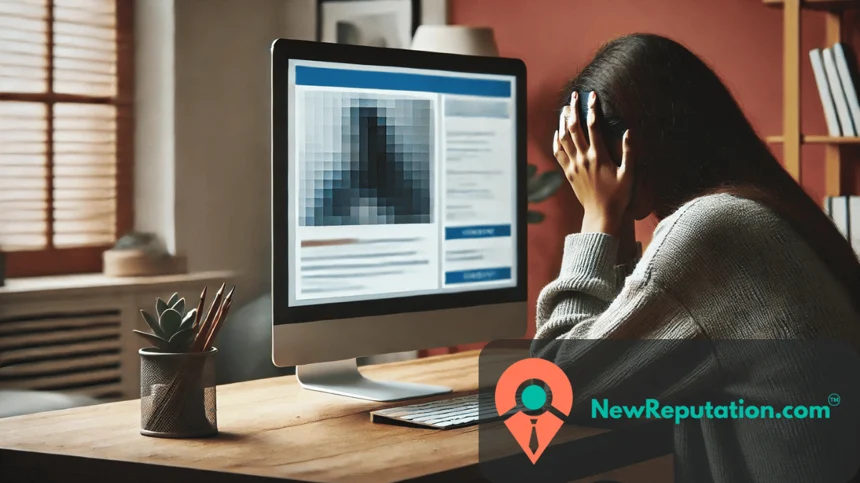Imagine waking up one morning to find out that intimate photos of you have been posted online without your consent. The shock, anger, and fear can be overwhelming. You might feel violated, helpless, and unsure of what to do next.
This article will help you act quickly if you find yourself in this situation. From immediate actions to legal recourse, emotional support, and long-term reputation management, we aim to provide a comprehensive resource to help you navigate this challenging time.
Common Situations That Can Lead to You Being Blackmailed With Nudes
Sharing intimate photos has become increasingly common. However, if these photos fall into the wrong hands, this can lead to distressing situations.
One common scenario involves relationships. Sharing intimate photos is a way to build trust and closeness during a romantic relationship.
Unfortunately, when the relationship ends, those photos can be misused by a former partner seeking revenge. This act, often referred to as “revenge porn,” is a malicious attempt to harm or control someone using private images shared in confidence.
Another scenario is the hacking of personal devices or accounts.
Cybercriminals can gain unauthorized access to your phone, computer, or cloud storage and steal private photos and videos. They might then threaten to release these images unless you pay a ransom or perform specific actions.
This type of blackmail, known as “sextortion,” is a serious crime that exploits your vulnerability.
Social media also poses significant risks. Posting or sending intimate images via social platforms can lead to unintended exposure. Even if shared privately, these images can be screenshotted, saved, or forwarded without your consent.
Additionally, meeting someone online who initially seems trustworthy but later uses shared images to manipulate you is another risk. This person might build a rapport, gaining your trust, only to exploit you later.
In some cases, individuals are tricked into sending intimate photos by someone posing as a love interest or a legitimate contact. This form of deceit, often called “catfishing,” involves the perpetrator pretending to be someone they’re not to obtain private images. Once they have these images, they can blackmail the victim.
Lastly, peer pressure and social engineering can also lead to the sharing of nudes. Teens and young adults might feel pressured by peers or significant others to send intimate images. This pressure can come from a desire to fit in or fear of losing a relationship. Unfortunately, once shared, these images can be used to control or embarrass the sender.
Immediate Steps to Take
Figuring out what to do if someone posts your nudes can be overwhelming. Especially if you are dealing with the emotional distress of betrayal. Here is where you should start:
Stay Calm and Avoid Impulsive Reactions
Do not immediately retaliate. Knee-jerk reactions can sometimes escalate the situation or complicate the process of getting the images removed.
Document Evidence
Before you do anything else, document the evidence. Screenshot the images, note the URLs where they are posted, capture usernames, and record timestamps. This information will be invaluable if you decide to pursue legal action or need to present evidence to facilitate removal.
Contact the Platform
Most social media platforms and websites do not allow non-consensual nudity. Report the images immediately using the following steps:
- Facebook and Instagram: Utilize the “Report” feature, specifically flagging the content as “Nudity” and “Involves a child” if applicable.
- Twitter: Report the tweet as “It’s abusive or harmful” and then select “Includes a private image.”
- Reddit: Click the “Report” button and select “Involves nudity” or “Involves a minor.”
Determine Consent and Distribution
If you did not give explicit permission for your intimate images to be shared publicly, you’re dealing with a clear case of non-consensual distribution, which can be grounds for legal action. Even if you consented to share the images with a specific person, this does not authorize them to distribute them further without your consent.
Reporting and Removing the Images
Once you’ve taken the initial steps to protect yourself, it’s time to report and remove those images from the internet. Here’s how to get it done:
Use Social Media Reporting Tools
Social media platforms have built-in tools for reporting non-consensual intimate images.
- Find the post with your image.
- Click on the three dots or “More Options” button.
- Select “Report” and choose “Nudity” or “Sexual Activity.”
- If the image involves a minor, make sure to indicate that.
- Locate the tweet with your image.
- Click on the down arrow or “More” icon.
- Select “Report Tweet” and then “It’s abusive or harmful.”
- Choose “Includes a private image” and follow the prompts.
- Navigate to the post with your image.
- Click on the “Report” button.
- Select the reason for reporting, such as “Involves nudity” or “Involves a minor.”
Request Removal from Search Engines
Prevent the images from appearing in search results by requesting their removal from search engines:
Google:
- Visit the Google Content Removal Tool.
- Follow the instructions to request the removal of the URLs containing your intimate images.
Bing:
- Use the Bing Content Removal Request form.
Contact Website Owners
If the images are on specific websites, contact the website administrators directly. Most reputable sites have a contact form or email address for reporting abuse or inappropriate content. Provide the necessary details and request immediate removal.
Use DMCA Takedown Notices
A DMCA takedown notice can be a powerful tool for removing unauthorized images. Here’s how to file one:
How to File a DMCA Takedown Notice:
- Identify the hosting website’s DMCA agent (usually listed in the website’s terms of service or privacy policy).
- Write a formal takedown request including your contact information, a description of the copyrighted work (your images), the infringing material’s URL, and a statement of good faith belief.
- Submit the notice to the website or hosting service’s DMCA agent.
What Legal Actions Can You Take?
Many states have laws against non-consensual pornography. These laws vary, but generally, they make it illegal to distribute intimate images without your consent. Some countries also have federal laws that protect non-consensual pornography. Research the laws in your state to understand what protections are available to you.
File a Police Report
Posting intimate images without consent is often a criminal offense. Filing a police report can initiate a criminal investigation. Contact your local police department to file a report, providing them with all the evidence and information you have gathered.
Send a Cease and Desist Letter
A cease and desist letter formally requests the perpetrator to stop their actions immediately. Your lawyer can draft this letter to demand the removal of the images and halt any further distribution. The letter should include a clear description of the illegal activity, a demand to cease and desist, and a warning of potential legal consequences if the actions continue.
Pursue Civil Litigation
If the perpetrator does not comply with the cease and desist letter or if you seek further justice, you can pursue civil litigation. Your lawyer can help you file a lawsuit for damages, which may include compensation for emotional distress, invasion of privacy, and other harms caused by the distribution of your images. Successful litigation can result in financial compensation and legal orders to remove the images.
Laws and Punishments for Posting Non-Consensual Nudes
Understanding the specific laws and punishments in your state can further empower you. For example, in California, non-consensual pornography is a misdemeanor that can result in up to six months in jail and a fine of up to $1,000. In Texas, it’s a felony with penalties, including jail time and substantial fines.
Case Example: People v. Bollaert
Kevin Bollaert operated a revenge porn website. In 2015, he was found guilty of 27 felony charges of identity theft, and 6 counts of extortion. He had set up his website so users could upload pictures taken of people when they were naked or engaged in sexual activity, without their permission, and then he would charge them money to have those pictures removed. Mr. Bollaert was sentenced to 18 years in prison; the penalties associated with uploading nude photos of someone who did not agree to it being posted is extremely severe.
Conclusion
Non-consensually posting intimate photos is an invasion of your privacy and can negatively affect your mental health and your sense of emotional well-being. A 2017 report from the Cyber Civil Rights Initiative states that one out of every eight social media users has been a victim of non-consensual pornography. If you’ve been the victim of someone posting intimate photos of you online, you should know that you’re not the first person to go through this experience and you’re certainly not alone. There are ways to help yourself, both emotionally and legally, and there are actions you can take to reclaim control over your life and online presence.
While the importance of protecting your mental health may be obvious, it’s also important to realize that there are also many practical and legal issues that need to be addressed after you’ve experienced having someone share intimate photos of you online. These include seeking support from friends, family, and professionals, finding a local support group, taking care of yourself (self-care), controlling what you post online and limiting your online exposure.
Managing the aftermath of having someone posting intimate photos of you online can be very overwhelming. This is where a reputable company specializing in online reputation repair can help you manage the process of removing the negative content from the internet, restoring your digital footprint, and helping you move forward with your recovery. At NewReputation.com, our goal is to help you recover and repair your online reputation and help you focus on healing emotionally, while we address the online concerns that need to be resolved.

Kevin Curran is the founder and CEO of NewReputation, a renowned online reputation management firm. He is also the co-founder of ReputationPrivacy, a platform designed to help individuals manage their digital footprint effectively. Kevin has worked with diverse clients, including Fortune 500 companies, high-profile executives, and small business owners, to establish an authentic online presence that accurately represents their brand.

